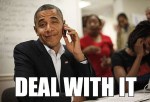Defenders of the National Security Agency’s surveillance of almost everyone in America say that the program is necessary because it is effective. The agency claims that PRISM and other programs have broken up dozens of terrorist attacks on Americans. They won’t say which alleged plots – except one, a 2009 planned attack on the New York City subway system, that turned out actually to have been disrupted by police at Scotland Yard. And the massive government snooping apparatus was useless against the Boston bombers, amateur terrorists who nevertheless had come up on the radar screens of two foreign intelligence agencies that tried to warn us. But that’s just an inconvenient truth.
Videos by Rare
Even granting that the government’s massive, invasive surveillance program may occasionally be effective misses the point. The NSA is intruding on what most people would consider their reasonable expectation of privacy. The government may argue that personal privacy must give way in the interests of the common good, but this is not a compelling case for so massive an intrusion, particularly when it is being done in secret.
Increasing public safety is an insufficient justification for the NSA’s super snooper program. The government could do all kinds of thing to keep us safer that we would never accept. Suppose that law enforcement decided to stop and search every car, every day. Yes, that would be effective, at first anyway. The police would find drugs, contraband, stolen vehicles, vehicles used in the commission of a crime, illegal firearms and explosives, people with expired driver’s licenses, maybe even the odd terrorist.
Or suppose everyone had to be fingerprinted every day, and their prints instantly checked against a massive Federal database. This would no doubt turn up fugitives and wrongdoers of all sorts. Suppose the state required daily DNA samples. Imagine the possibilities. Forget probable cause, or unreasonable search and seizure. Let’s just say everyone had to cooperate with everything the government wanted to do, all the time, and all in the name of making everyone just that much safer. Would you want to live in that society? Would the marginal increase in security be worth the ongoing, pervasive intrusion into your daily life? How much liberty would you have to give up before the government declared you “safe?”
The NSA’s utilitarian defenders seem to forget that the foundational American value is freedom. Freedom carries risks, and living risk-free is not living free. A program that tramples freedoms in the name of security, even if it is marginally effective, is un-American. Polls show that more people fear the government as a threat to their freedoms than they do terrorists. It turns out that their fears are justified.
James S. Robbins is Deputy Editor of Rare and author of Native Americans: Patriotism, Exceptionalism, and the New American Identity. Follow him on Twitter @James_Robbins



23 Comments
Leave a Reply23 Pings & Trackbacks
Pingback:Move over NSA, here comes the Obamacare Big Brother database | Rare
Pingback:Move over NSA, here comes the Obamacare Big Brother database | unSpy
Pingback:OBAMACARE DATABASE WORSE THAN NSA SNOOPING | Nwo Report
Pingback:Think the NSA Know You? Wait Until You Experience the Massive Obamacare Centralized Database | Peace and Freedom
Pingback:Obamacare Database Worse Than NSA Snooping | Anti Oligarch
Pingback:Move over NSA, here comes the Obamacare Big Brother database | L.I.I.S. Online
Pingback:Move over NSA, here comes the Obamacare Big Brother database
Pingback:Move over NSA, here comes the Obamacare Big Brother database | Nwo Report
Pingback:Obamacare Database WORSE Than NSA Snooping | The Conservative Voice
Pingback:Move over NSA, here comes the Obamacare Big Brother database! | We Win They Lose
Pingback:Move Over NSA, Here Comes the ObamaCare, Big Brother Database | Hebrew Nation Online
Pingback:Move over NSA, here comes the Obamacare Big Brother database | Thought FTW
Pingback:Unintended Consequences? ObamaCare Database More Intrusive Than NSA | LaborUnionReport.com
Pingback:Move over NSA, here comes the Obamacare Big Brother database |
Pingback:OBAMACARE DATABASE WORSE THAN NSA SNOOPING | END TIME HEADLINES
Pingback:Move Over NSA, Here Comes The Obamacare Big Brother Database | PatriotsBillboard
Pingback:Obamacare Data Hub: Like NSA & IRS Combined and Run by Partisan Hacks - Right 180 News
Pingback:Move over NSA, here comes the Obamacare Big Brother database | Republican Party of Milwaukee County
Pingback:Obamacare ‘Navigators’ will have unlimited access to personal data
Pingback:Move over NSA, here comes the Obamacare Big Brother database | My 2 Cents
Pingback:The Obamacare train wreck continues to gather steam… | TODAY in the USA: This Is The New Normal
Pingback:Think IRS Abuse Of Power Was Bad? Wait Until ObamaCare Comes Around… | Flopping Aces
Pingback:Obamacare ‘Navigators’ Will Have Unlimited Access to Your Personal Data